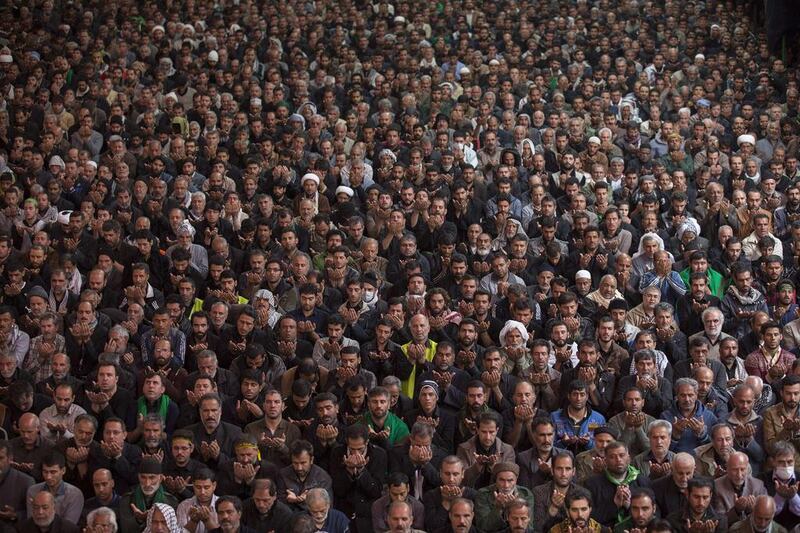KARBALA, Iraq // A deadly mortar attack on Friday near the Iraqi city of Karbala stoked security concerns as millions of Shiite pilgrims gathered for one of the largest religious gatherings in the world.
A day before the Arbaeen commemoration reached its climax, a sea of black-clad devotees filled the streets of the holy city, waving flags, beating their chests and chanting.
“There were one person killed and four wounded when mortar rounds hit an area on the western side of the city” shortly after midnight, a police colonel said.
“They crashed into an area called Souk Al Basra, around seven kilometres from the city centre,” he said, adding the victims were residents and not pilgrims.
Record numbers of Shiite faithful have been converging on Karbala from across Iraq and other countries for Arbaeen, which marks the end of a 40-day period of mourning following the anniversary of Imam Hussein’s death.
Imam Hussein is one of the most revered figures for Shiites, who are the largest community in Iraq and the overwhelming majority in neighbouring Iran.
The Iraqi defence minister Khaled Al Obeidi said on Thursday that more than 17 million pilgrims had come to Karbala for Arbaeen, which in a normal year is already considered one of the largest religious gatherings in the world.
Brigadier General Qais Khalaf Rahim, head of operations command for the Karbala area, said “the number of visitors is far greater than last year’s”.
“We had to open more routes to Karbala and double the number of cars, buses and trucks transporting pilgrims to the city.”
This year’s pilgrimage has taken on a political dimension as it is the first since ISIL launched a devastating offensive in Iraq in June.
The militant group – led by Sunni extremists – considers Shiites to be heretics and has made targeting the community one of its main objectives.
Millions of faithful have for days been converging on the holy city where Imam Hussein was killed in battle and beheaded in 680AD, entire families trekking for days on the roads and sleeping in the open.
Central Baghdad has been in lockdown mode for much of the week as authorities restricted access and movement in order to avoid a complete logjam and minimise the risks of major bomb attacks.
Three people were killed and four wounded earlier this week, according to security and medical sources, when a bomb went off in north-eastern Baghdad near one of the thousands of tents set up to serve food and beverages to marching pilgrims.
Three people also died on Friday in a stampede as they crossed the border from Iran, a spokesman for the Iraq Red Crescent said.
However, given how exposed the pilgrims are and what a prime target they are for ISIL fighters, very few incidents have been reported so far.
Iraqi officials have stressed how crucial a recent military victory against the militants in the Jurf Al Sakhr area has been in making the pilgrimage possible.
The continued presence there of ISIL fighters would have exposed the millions of southbound pilgrims walking through an area which has seen some of the worst sectarian violence of the past decade and been dubbed the “triangle of death”.
Shiite militias have played a leading role in the battle for Jurf Al Sakhr, an area between Baghdad and Karbala where militants were supplied from their strongholds in the western Anbar province and which has seen some of the fiercest fighting since June.
The Iraqi communications minister, Hassan Al Rashed, said earlier this week that fighters who took over former ISIL positions in Jurf Al Sakhr found evidence that the militants had been planning to target Karbala.
The bombing of a revered Shiite shrine in the city of Samarra in February 2006 was the main trigger for a bloody sectarian war between Iraq’s Sunnis and Shiites.
* Agence France-Presse





